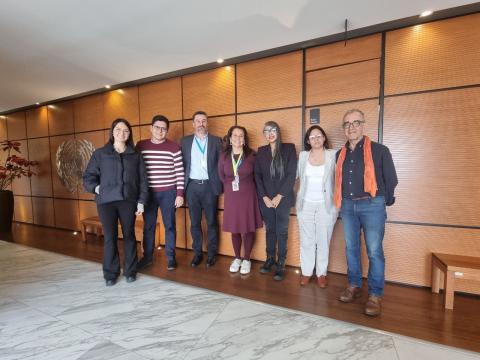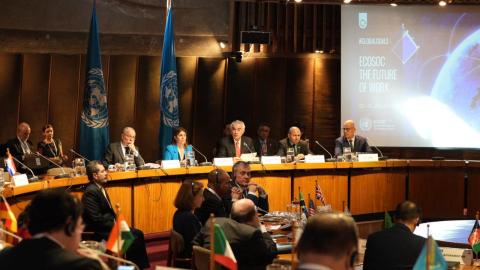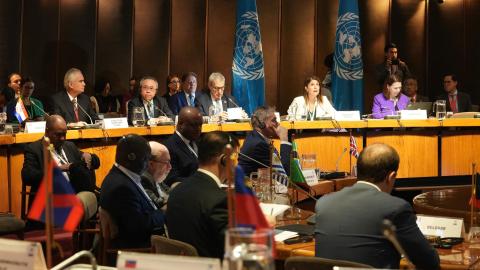News
Evolving Development thinking and practices in
Latin America and the Caribbean: The role of ECLAC
Keynote Address by Dr Antonio Prado
Deputy Executive Secretary
18th CDCC Monitoring Committee
Port of Spain, 19 May 2017
I thank Diane for that very fitting introduction to my presentation here this morning. We have begun considering how best to commemorate 70 years of ECLAC’s work as a Regional Commission of the United Nations. As you have just seen, our support for development in the region has taken many different forms. However it is safe to say that our principal contribution has been as a think tank, advancing economic ideas that address the development challenges faced by the member States, and assisting in the design of policy responses in the search for workable solutions. This unquestionably is the legacy of which we are most proud.
Today I wish to reflect on ECLAC’s development thinking and practices as they have evolved within the Commission over the past 69 years, and how this has influenced our engagement in Latin America and the Caribbean. Yesterday, you focused on accelerating SDG implementation in the Caribbean, and it occurred to me that even as we grapple with new and emerging challenges, there are some long standing issues that persist, and solutions to these could guide us in the current context marked by increasing uncertainties.
Some of these issues were at the heart of the debate led by ECLAC (CEPAL) in its early years under the leadership of Raúl Prebisch,[1] eminent economist who served as the second Executive Secretary of ECLAC, from 1950 to 1963. Prebisch like Arthur Lewis was a man of extraordinary inventiveness and talent, and under his tenure, CEPAL became the think tank for new ideas on development strategies, for Latin America and even the wider Third World. Many of these ideas found root in Caribbean scholarship through the New World group[2], as well as those who favoured “dependency theory” and others for whom the issue of unequal exchange was a central issue. At the same time Sir Arthur Lewis developed a variant of the industrialisation thesis in his seminal work on “The Industrialization of the British West Indies”. In it he argued for the role of industrialisation not as an alternative to agriculture but as a complement to improving its productivity.
During that period Prebisch and his collaborators, including the Brazilian economist Celso Furtado, were at the forefront of development thinking; a discipline that was still in its infancy. He subsequently became the first Secretary General of UNCTAD, from 1964 to 1969, and through his influence, helped to internationalise ECLAC thinking on development. He later returned to the CEPAL fold as the head of The Latin American Institute for Economic and Social Planning (ILPES), where there was a strong emphasis on industrial planning, policy advice and capacity building. This link between ideas on development, planning, statistics and practice is no less important today as we approach the SDG implementation and its monitoring.
It is not possible for me to touch on all the issues pursued in those first three transformative decades at CEPAL, but there are some important highlights which I would like to share with you today. While Prebisch is best known for the centre periphery thesis in which the gains from trade went mostly to the hegemonic centre from the primary exporting periphery of which Latin America was a part, the central theme was the need for industrialisation.
A strategy that was very much part of the Lewis approach in his dual economy model. He like Lewis emphasised balanced growth to address the overarching poverty which was a strong feature of the Latin American and Caribbean economic landscape. Balanced growth was also necessary to help develop the agrarian sector and arrest the rural urban drift resulting from rural unemployment. Among other issues addressed was the impact of foreign direct investment on indigenous development, the role of intra-regional trade, insufficient low cost external financing, the impact of foreign debt and the need for long term vision and planning[3].
The famous Prebisch-Singer hypothesis provided an explanation for the process of unequal exchange in the global trading system. That is, the problem of declining terms of trade for primary commodity exporters[4]. Lewis also addressed the issue in his famous article on “Economic development with Unlimited Supplies of Labour”. He argued that it is the productivity of the factors of production in the developing countries that determine the rate at which commodities are exchanged, and that this trend had moved continuously against developing countries since the 19th Century. Reversing this trend would therefore entail increasing productivity.
The increasing reliance of several Latin American economies on the primary production, in the face of the emergence of China, recognises the need to reduce the dependence on a few commodities by means of structural change. Issues of the informal sector as well as high unemployment and income inequality, continuing challenges in the Caribbean, were themes which also consumed the minds and efforts of the cepalismo in articulating strategies for development. With his characteristic eloquence Prebisch wrote in “Change and Development”[5] on the issue of inequality: “Economic considerations are not necessarily at variance with social needs, but when growth is sluggish, distribution is always unsatisfactory. The practice of social equity calls for a vigorous rate of development, as well as for the political art of distribution, a delicate business in itself.”
It is also important to note that the series of regional reports, including a focus on statistics, which continues to this day, helped provide an evidence based context for discussing regional issues. In this regard the Caribbean is still plagued with lack of data and ECLAC continues to examine ways to address this challenge especially in light of the need to monitor the SDGs.
Another area of concern was how domestic policies under the import substitution industrialization strategies (ISI) of the 1960’s helped to undermine regional integration by setting up impenetrable barriers to regional trade flows. Prebisch was concerned about this and often wrote about the problem of excessive protectionism which stultified local industry and affected regional inter-industry integration. In fact, it is now clear that in the early phase of their development, the Asian tigers did use a limited ISI strategy to develop indigenous capacity[6].
The structuralist agenda with its emphasis on removing barriers to industrial expansion and the development of indigenous technical know-how waned in the 1980’s with the resurgence of the role of markets and a diminished role for the state under the Washington consensus. This viewpoint reinforced by the World Bank, the IMF and other international financial institutions was to dominate mainstream development thinking and practice for two and a half decades. This was buttressed by the cold war thaw and the consolidation of Reagan/Thatcherite perspectives on the virtues of privatisation and liberalisation. A very important feature of this period was also the undermining of regulatory state institutions and the retreat from developing local technical capacity on the assumption that this could be acquired in the marketplace.
The fallout from structural adjustment, arising from increasing poverty and inequality, plus lack of regulation and a growing informal sector, was to create what in Latin America and the Caribbean has been called the lost decade. However it took the recent global crisis of 2008-2009 to again create the space for heterodox thinking on economic development. Economists of no less reputation than Joseph Stiglitz[7] and Danny Rodrick[8] have posited a renewed role for industrial policy and Rodrick has argued for a more sympathetic interpretation of such policies in prior decades. ECLAC as part of its advocacy for structural change to reduce vulnerabilities and promote sustainable development among Caribbean SIDS, has called for industrial restructuring to address a variety of structural gaps.
ECLAC has never abandoned its structural roots and issues of structural heterogeneity, the problems of poverty and inequality and the need for progressive structural change have been retained as part of its toolkit of analysis under a number of Executive Secretaries. Four important publications, Time for Equality: Closing Gaps, Opening Trails; Structural Change for Equality: an integrated approach to development, Compacts for Equality: Towards a Sustainable Future, and Horizons 2030: Equality at the Centre of Sustainable Development, represent an updating of the structural agenda with a strong focus on progressive structural change, recognition of the challenge of poverty and the need for environmental security and for achieving gender equality. Equality is at the core of ECLAC’s thinking on how to promote sustainable development in the region.
Each of these documents continues to wrestle with deep seated problems including appropriate macroeconomic policy and practice. The “centre” has changed and new actors have come to the table in a multi-polar world which is new, different, and more complex, requiring new approaches, new linkages and spaces for partnerships. However the lack of finance for development (a deep concern of both Prebisch and Lewis), the inequality in trade relations and the need for building domestic technical capacity remain challenges to be addressed[9].
Recent US policy shifts, which echo old notions of protectionism, may very well result in a retreat from multilateralism which may weaken the position of SIDS. These changes together with the tendency towards mega trade agreements are equally challenging to Caribbean Small Island Developing States. Added to this are increasing exposure to negative external shocks, high debt, challenges in health, the impact of climate change and the effects of extreme events.
ECLAC has been in the forefront of both enabling and monitoring the implementation of global mandates. This has been particularly so in the Caribbean with respect to the Barbados Programme of Action (BPOA), the SAMOA Pathway and more recently the 2030 Agenda for Sustainable Development and the 17 Sustainable Development Goals (SDGs) which is the quintessential approach to balanced growth. The mainstreaming of the SDGs in national development planning and the acceleration of SDG implementation represent opportunities for the Caribbean to reach its full development potential in a sustainable manner.
From ECLAC’s view, the SDGs should not be seen as new burdens to be shouldered by already overtaxed economies, but as an opportunity to re-examine old approaches so as to extract fresh ideas on how to meet the emerging challenges of the day. ECLAC has called for a big environmental push, a push for gender equality and women’s empowerment and for a reduction in income inequality, as well as for further investment in science, innovation and technology.
We have also made a strong case for debt reduction based on “debt for environmental swaps” to create the fiscal space necessary for Caribbean countries to effectively address the 2030 Agenda. In a world of increasing uncertainty, small States will need to be nimble, and to be ready to collaborate both regionally and extra regionally to mobilize support for a central strategy of resilience building.
As we prepare to commemorate our 70th anniversary, we will use every opportunity to encourage a search for solutions to the hurdles that you must clear by revisiting the age-old yet ever-relevant development strategies rooted in the work of the Latin American and Caribbean economists that have provided a solid theoretical and practical foundation for advancing development in our region. Join me in celebrating their collective contribution today.
Thank You.
[1] From 1935-1943 Raúl Prebisch was the first director of the Argentinean Central Bank.
In 1948, he was invited by ECLAC to draft a report on the development of Latin America and its problems, "El manifiesto." In these founding years of ECLAC, this commission was led by the Mexican economist Gustavo Martinez Cabaña as Executive Secretary. This position would soon be co-opted by Prebisch himself (from May 1950 to July 1963).
[2] The thesis of this group is epitomized in George Beckford’s Plantation economy.
[3] See Raul Prebisch, Change and Development: Latin America’s great task. ECLA, 14 session, Santiago Chile, May 1971.
[4] There were debates as to whether it should be the income terms of trade vs relative prices. See Joseph L Love. The rise and decline of economic structuralism in Latin America. Latin American Research review, Vol 40, No.3, October 2005.
[5] See reference before.
[6] In the mid-1980s Fernando Fajnzylber analyzed the evolution of these economies in his classic work Industrialization in Latin America: from the black box "to the" empty box ": a comparison of contemporary industrialization patterns" (Fajnzylber, 1990).
[7] Joseph Stiglitz, Public Policy for knowledge economy. Department for Trade and Industry
And Center for Economic Policy Research. London, U.K. January 27, 1999.
[8] Danny Rodrick. Industrial policy for the 21st century. John F. Kennedy School of Government
79 Kennedy Street. Cambridge, MA 02138, Sept 2004.
[9] Under the Global Climate Fund pledged funds do not equal actual resources and the access of small developing countries is limited.


